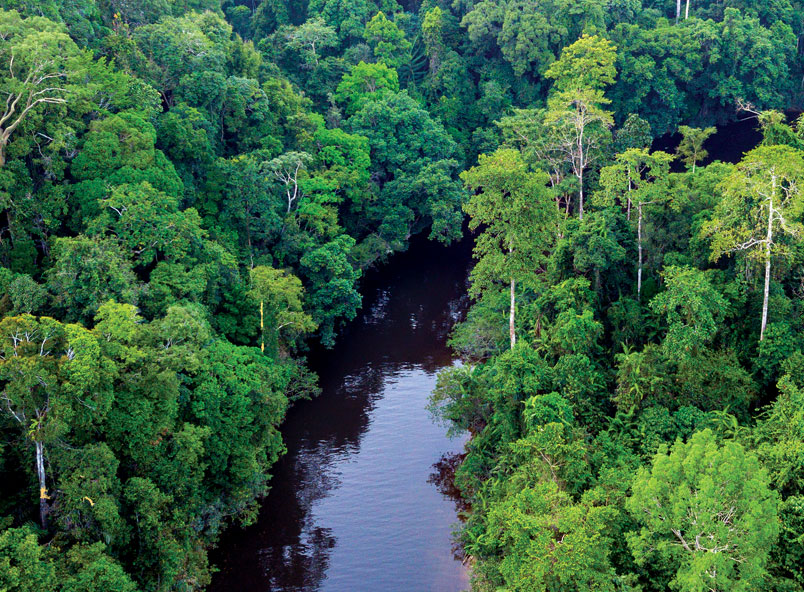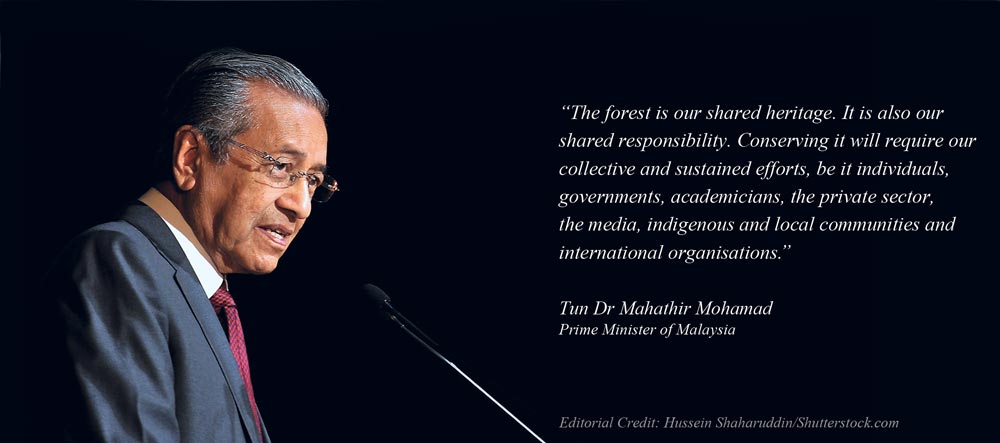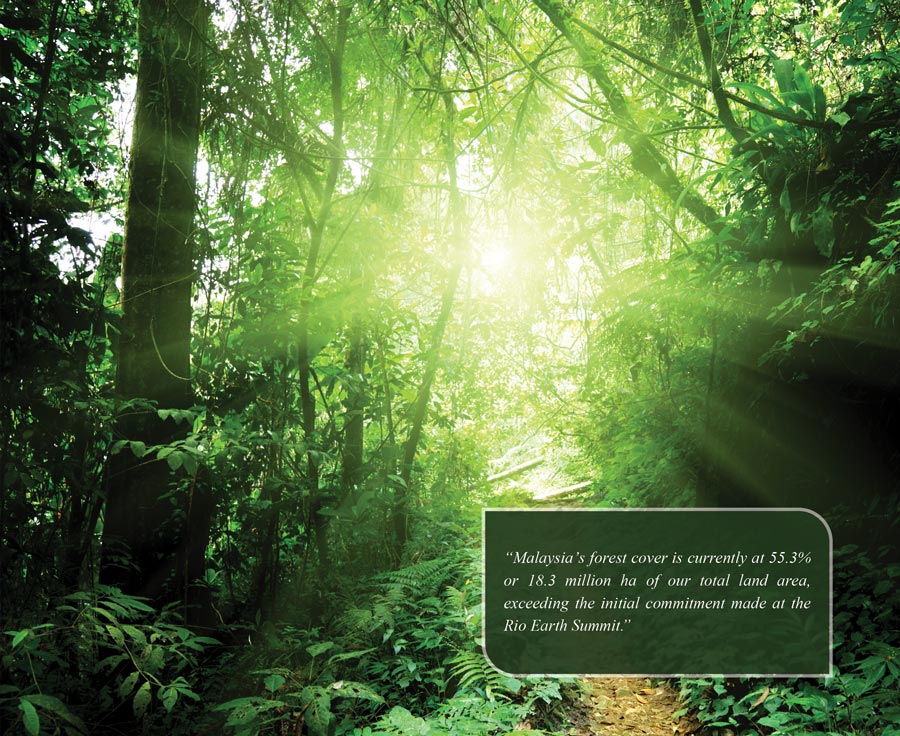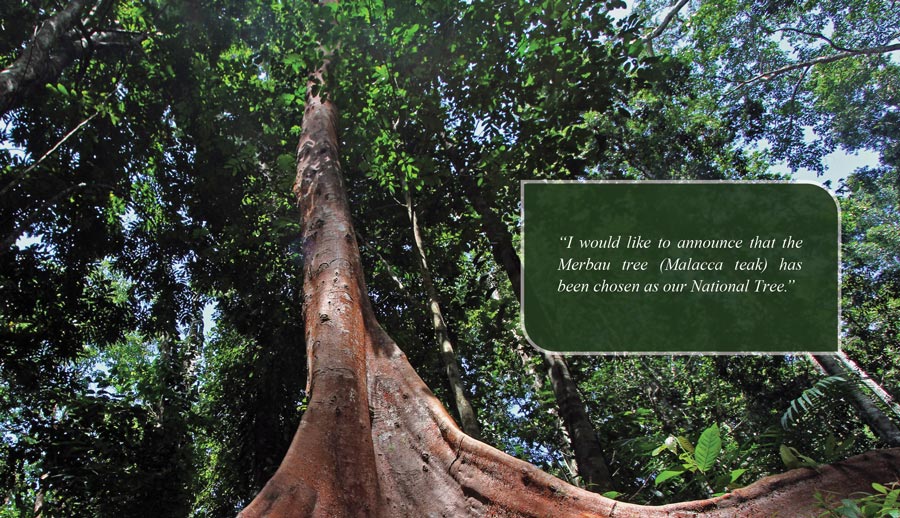




The Hon. Tun Dr Mahathir Mohamad, the Prime Minister of Malaysia, opened the month-long ‘Hutan Kita’ (Our Forest) exhibition at the Kuala Lumpur Tower on Aug 23, 2019.
In his address, he drew attention to Malaysia’s commitment to maintain at least half of the total land area under forest. New measures, he said, will be implemented post-2020 to mainstream biodiversity in the socio-economic development agenda. He also rebutted criticism of the Malaysian palm oil industry in relation to alleged deforestation.
“I would like to thank the Ministry of Water, Land and Natural Resources and [the Hon.] Dr Xavier Jayakumar for inviting me to address and officiate the first of its kind ‘Hutan Kita’ exhibition.
When translated, it would be ‘Our Forest’, a powerful affirmation that the forest belongs to us. We could take the irresponsible contention that, since it belongs to us, we can very well do what we like with it. But I would like to believe that our interpretation of the tagline is positive in that, since the forest is ours, it is our responsibility to protect and conserve its longevity, sustainability and beauty.
Further to that, it is also a declaration that it is something shared, meaning that protecting and conserving the forest is not only for ourselves and the present generation, but for future generations. It is therefore a pleasure to be here today to witness this exhibition displaying our natural treasure, filled with its richness in biodiversity of flora and fauna.
Malaysia’s rainforests are among the most diverse on the planet. Pristine forests of all kinds occur across Malaysia, with complex structures from the mangrove forest to the highland forest. Even small areas of forest are richer in tree and wildlife species than most similar-sized areas in tropical Africa or America.
Unlike many nations which rely on finite natural resources such as fossil fuels or minerals, Malaysia has been blessed with a renewable resource which, when managed carefully, will continue to provide for our nation indefinitely. Not only do our abundant forests provide us with renewable timber and other forest products, but the tropical climate means our agro-commodities yield harvests which do not occur in more temperate regions.
At the Rio Earth Summit in 1992, as the Prime Minister of Malaysia then, I made a pledge that Malaysia is committed to maintain at least 50% of our land mass under forest cover. Today, almost three decades later, I am proud to announce that we have not reneged on that pledge.
Malaysia’s forest cover is currently at 55.3% or 18.3 million ha of our total land area, exceeding the initial commitment made at the Rio Earth Summit. This represents the nation’s will and commitment to conserve and sustainably manage our forest, its flora and fauna.

It represents our ability not only to honour our promise to our global partners, but to outdo even our own expectations. Our forest cover today is far higher than that of most large European countries including France, Germany, Italy and the UK.
Despite Malaysia’s economic growth and rapid urbanisation, maintaining the forests and making existing agricultural land more productive to meet increasing demand, could not have been achieved without adopting pragmatic, progressive and sustainable development policies.
The Land Conservation Act 1960, Wildlife Protection Act 1972 and National Forestry Act 1984 were instrumental in providing the legal framework to cover every aspect, including land use, wildlife protection, and the administration and conservation of forests.
Balancing conservation and development
Malaysia has been taking comprehensive measures to ensure that economic development did not come at undue sacrifice of its natural resources. By implementing programmes for poverty eradication, forestry management and protection of the country’s rich biodiversity, Malaysia has worked hard to ensure that economic development and environmental conservation go hand in hand.
As we make the transition towards becoming a developed nation, we put increasing pressure on our natural habitats and the species that they nurture. A key challenge therefore is to make that transition while ensuring that our forests are safeguarded. While focusing on economic growth and development, the government gives equal emphasis to promoting conservation of natural resources.
When logging becomes absolutely necessary, we have in place mechanisms that improve the sustainability of this industry. Sustainable Forest Management is pursued through various national strategies and programmes, such as the forest certification initiative and the implementation of best agricultural practices.
Malaysia has been implementing forest certification since 2001 through the Malaysian Timber Certification Scheme (MTCS), as a voluntary scheme. The MTCS has become a leading timber certification scheme for tropical forests in Southeast Asia. It has also been accorded international recognition by becoming the first tropical timber certification scheme in the region to be endorsed by the Programme for the Endorsement of Forest Certification, which is currently the largest forest certification system in the world.
Having said that, although Malaysia has put in place various efforts to prevent forest loss, we still face challenges from our growing socio-economic development needs. The increasing population brings with it increased demand for food, water and infrastructure, which places pressure on our forests.
The impacts of climate change further add to this pressure. Extreme changes in rainfall patterns, as well as extended dry spells, affect our forests’ ability to store and produce fresh water. Extreme storms uproot trees and damage forest habitats. Increasing temperatures negatively impact biodiversity, especially of insect populations, driving away or wiping out available pollinators.
Under the Eleventh Malaysia Plan (2015-20), substantial national resources have been allocated to enhance a wide range of actions to address climate change. Among the actions we have undertaken is to further enhance conservation and restoration efforts – it is known that, even though climate change can affect our forests, our forests can be used to reduce the impacts of climate change and to stabilise the changing climate.
Malaysia’s commitment
Notably, Malaysia has implemented two national initiatives, namely the Central Forest Spine in Peninsular Malaysia and the Heart of Borneo in Sabah and Sarawak, to protect ecosystems, while building resilience of our forests to climate change and to increase connectivity between forest reserves.
Moving forward, the government will outline eight key actions that will be implemented to enhance efforts in sustainable forest management and mainstreaming biodiversity in Malaysia’s socio-economic development agenda in the era of post-2020.
On the global front, as one of the world’s most biodiverse nations, Malaysia takes its commitment to conservation seriously and is proud to be a signatory to an extensive list of global treaties on conservation, wildlife, forestry and the environment.
Malaysia is party to various multilateral forest conservation-related conventions and agreements, such as the Convention on Biological Diversity, United Nations Framework Convention on Climate Change, Convention on Wetlands of International Importance and Convention on International Trade in Endangered Species of Wild Flora and Fauna. As party to these conventions, Malaysia is obliged to develop national strategies, plans and programmes by taking measures for the conservation and sustainable use of natural resources.
Malaysia sees these agreements as a key part of its formula for balance in the sense of its responsibility to the planet and responsibility to its people to ensure their right to food, clothing and shelter – and balance in the right every nation enjoys to employ its natural resources to raise its people out of poverty; and to seek long-term, sustainable and shared prosperity for the country.
The challenges
We have been accused of putting the need for development before the needs of our forests. The issue of deforestation for oil palm plantations has always been championed by our detractors.
The claims linking palm oil to deforestation are baseless, unfair and unjustified. These claims bring negative impact to Malaysia which depends highly on the palm oil industry to raise the socio-economic well-being of our people, in order to help us achieve the Sustainable Development Goals (SDGs).
It has also significant detrimental effects on oil palm growers who include 650,000 smallholders, as well as another 1.5 million people employed throughout the palm oil supply chain.
The truth is, the palm oil industry in Malaysia has been developed sustainably and responsibly. The government, in adhering to the SDGs, has put in measures to ensure this industry does not cause environmental degradation, as well as to avoid unsustainable practices such as destruction of forests and wildlife habitats.
The Malaysian palm oil industry is now focusing on improving productivity and yields rather than expanding land, in order to avoid deforestation and direct or indirect land use change. Apart from that, restrictions have been imposed on the planting of oil palm on peatland as well as in Permanent Reserved Forests.
In line with the above, the government has set the maximum arable land for oil palm cultivation at about 6.6 million ha by 2023. It is encouraging that the state of Sarawak has imposed a moratorium on state land for oil palm plantation; it does not allow new planting of oil palm on state land including on peatland.
Malaysia stands proud to share some of our sustainable practices with the world. We introduced the Malaysian Sustainable Palm Oil (MSPO) Certification Scheme in 2013 and it will be made mandatory commencing Jan 1, 2020. This certification wholly and clearly addresses global concerns on the sustainable production of palm oil, including that of biodiversity loss, greenhouse gas emissions and destruction of wildlife habitats. Through the MSPO, every drop of palm oil produced in Malaysia will subscribe to sustainability practices.
Shared responsibility
The forest is our shared heritage. It is also our shared responsibility. Conserving it will require our collective and sustained efforts, be it individuals, governments, academicians, the private sector, the media, indigenous and local communities and international organisations.
Everyone has a part to play, and we all need to come together for our forests and for the sake of future generations. To enable greater implementation of forest conservation – as well as overcome gaps and constraints faced – adequate and substantial technical and financial resources are needed. Malaysia will continue to explore opportunities in accessing support from developed countries and international organisations.
In conjunction with this auspicious event, I would like to announce that the Merbau tree (Malacca teak) has been chosen as our National Tree. With its hardy nature, I believe that all Malaysians, can take the Merbau as a symbol of national pride.

I hereby reaffirm Malaysia’s commitment to maintain at least 50% of our land area under forest cover in accordance with our commitment made at the Rio Earth Summit in 1992. I am indeed confident that the ‘Hutan Kita’ Exhibition will be a catalyst in increasing awareness among us with regard to our forest. It is our forest and therefore we are responsible for it.”
Pages : 1 2